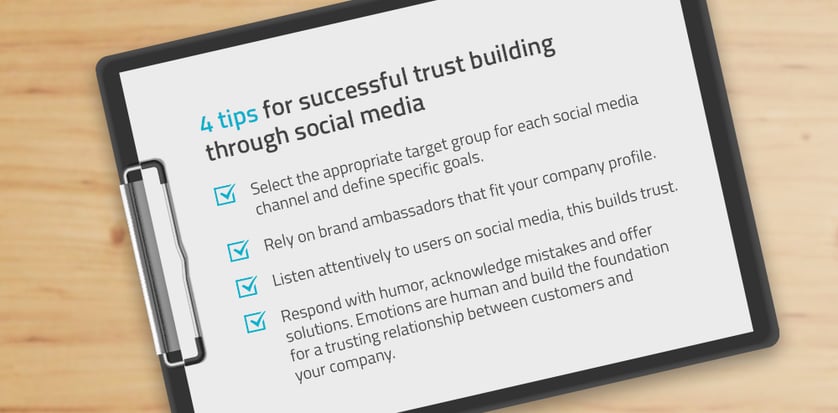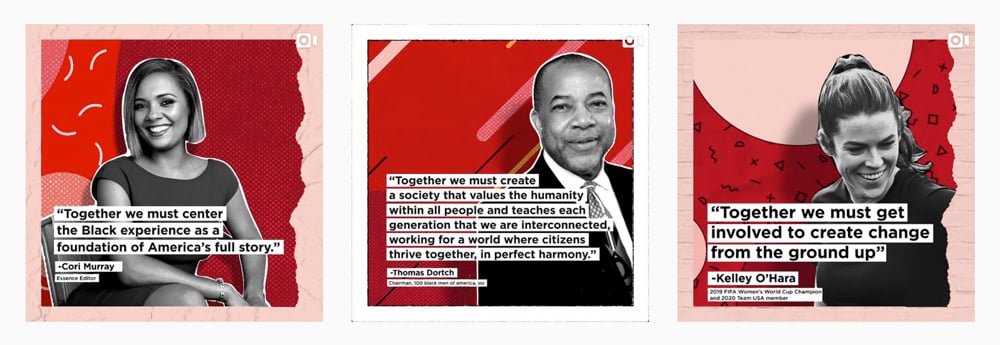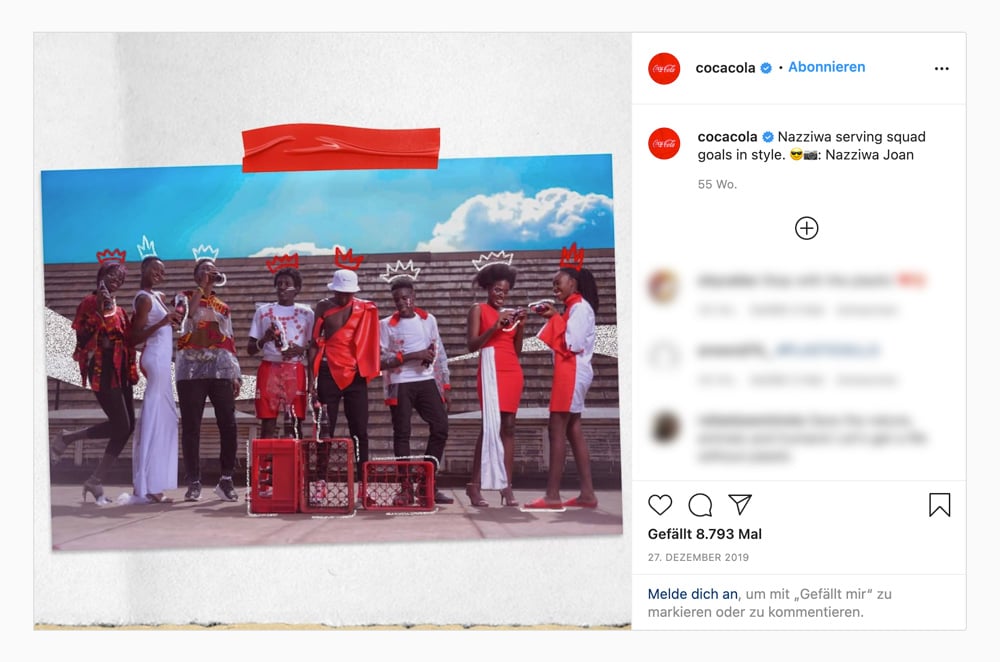Building trust with social media – here's how it works
Last updated: April 5, 2023Why you should be on social media as a business?
In today's world, communication with customers and prospects increasingly takes place via digital channels, and more and more frequently directly via social media platforms. For years, studies have shown a continuous increase in social media users on almost all popular channels. Facebook continues to lead the way. 94% of companies that are active on social media have a Facebook account. Only then do sites like Instagram (76%), LinkedIn (59%) and YouTube (53%) follow.
Up-to-dateness, emotionality and originality show, thanks to visually appealing stories, that you're not just on Instagram because all your competitors are there, too. No, you're on Instagram because you're setting very individual accents on this channel that aren't possible in the same form on other social platforms. While there are social media campaigns that have led to gigantic increases in sales, it's not the standard. In general, aggressive marketing tends to be perceived as annoying, intrusive and untrustworthy. To establish, test and control your good reputation online, companies and service providers agree: every company can bank on at least ONE well-managed channel.
Which social media channel is right for your business?
Instagram is just as suitable as Facebook for brand, image and community building. Above all, Instagram should not be underestimated as a platform for influencers. No other social channel in Germany is currently enjoying such success in influencer marketing as Instagram. Cristiano Ronaldo recently topped the list of the most successful influencers on Instagram and is estimated to earn up to 2 million euros per post. Twitter users enjoy an active exchange of opinions and relevant news. It is also used heavily by politicians in particular, as one could see from the example of the last U.S. president. Snapchat and WhatsApp targets are also more entertaining and informative than sales-promoting - apart from discount promotions. Nevertheless, political and social change not infrequently lead to rapid adjustments and changes, so channels should be reviewed regularly. How TikTok's current triumphant success will develop remains to be seen.
Building trust with the right email marketing? We show you how it works!
Which social network is suitable for which target group?
The following also applies in digital worlds: You can’t have your cake and eat it too. Not all new platforms are suitable for every company and its target groups. TikTok, for example, is currently very trendy - but not necessarily the right channel for a conservative company. The following questions help in selecting the right social media platform: Does your own target group actively use the social media channel? Which platforms are used by the competition? Can the company's own brand identity be communicated authentically via the channel? And what technical requirements (e.g. equipment) need to be considered? Another question that should not be underestimated is the trustworthiness of the chosen social media platform in general. LinkedIn enjoys a particularly high level of trustworthiness in the B2B environment, as several surveys have shown. The network is therefore suitable for campaigns with a high credibility factor. Finally, a certain level of media competence is important for building trust. If a company does not properly understand the functionality of Twitter, Instagram, Facebook, and the like, trust will hardly develop among the target group.
How do you engage with customers on social media?
Communicating with your followers is the be-all and end-all of successful social media efforts. The basis for this is the ability to listen. That means not simply inserting prefabricated standard responses to user comments. Followers will only take a brand seriously if the brand takes them seriously. In addition to proper communication, this includes active community management. Engage in a direct exchange with your followers and follow up on comments that are not so positive: How was the user comment meant? What exactly does it refer to? What can you do to resolve doubts or frustration? It is at least as important as listening well to enter into the conversation authentically. Emotions are very important here! Every personal response is worth more than a perfectly considered standard phrase - whether funny, sad, or quick-witted. When a brand shows emotionality on the social web, it takes on human traits and is perceived as much more credible. Regular appointments for live chats or live videos also consolidate user interactions.
Actively engage fans
Followers feel good when you take them seriously and integrate them into your social media activities. One of the best-known examples is McDonalds' fan burger. These were integrated into the official product range at some point. All who were merely onlookers during the campaign then realized that the burger giant takes such social campaigns seriously and includes concrete wishes from fans in product development: A competitive advantage that not everyone can offer. Nevertheless, this approach has been copied several times by different companies in recent years.

Gain "social trust" - digital brand ambassadors can help
A successful brand needs a face with an interesting, human personality - shaped by socially active employees: digital brand ambassadors. Apart from their own employees, companies can rely on influencers or micro-influencers who present their own brand authentically. Just as important: their satisfied customers, who report on their experiences on social networks. Responding to both positive and negative criticism, making it visible to all followers, increases credibility. Fans of the watch brand Daniel Wellington, for example, take this approach by posting their own pictures on Instagram with the hashtag #danielwellington, showing them out and about in a wide variety of places with the watch on their wrist. The brand reposted the best pictures. Other users thus understand how much the brand is trusted.
Brands like Hello Body, Mermaid+Me, and Banana Beauty have relied almost exclusively on influencers and their followers to market their products from the beginning. By means of regular discount code campaigns, these brands have been able to generate more than 100 million euros in sales in recent months, even though the brands have only been on the beauty market for a few years.
Why do users follow a brand online?
From the user's point of view, there are various reasons for following a brand or a company. On the one hand, users are interested in studies and tips that the company publishes regularly or hope to learn about product innovations or updates at an early stage. It is also not uncommon for them to follow companies and brands because they can participate in special discount campaigns or competitions on social media. In recent years, the importance of online customer reviews has increased, so many users are on the channels to read about other customers' experiences. Teens see social media as an important source of information for "having their say." When they follow brands and companies, it's because they're in the mood for fun and entertainment.
Anything that adds value to customers is good for your business and reputation. But how can a company be perceived as better, more entertaining, more informative than its competitors in the battle for attention? How can a fan, once won, be permanently retained? The answer to all these questions is: publish content on your channels that offers the target group relevant added value. Videos with behind-the-scenes insights, guides and tutorials, interviews, exciting facts and figures, but of course also discount promotions, competitions or events to which only social followers are invited. But here too, use the promotions sparingly.
Being active on social media as a company - these are the no-go's!
As the name suggests, social networks focus on the social aspects. Therefore, it is a clear taboo to bombard users and followers with too many advertising messages. 46% of users find too many advertising messages annoying. Instead, use the standard ads of the respective platform. Use isolated, but well thought-out campaigns that appeal to your followers and inspire them. Don't post just for the sake of posting. Again, sometimes less is more. You want to add value to your subscribers, not spread irrelevant information.
An often underrated taboo is not replying to comments and messages. It can quickly become overwhelming to keep an eye on the inboxes of various social media channels in addition to the support and info inbox and telephone availability. But again, respond as quickly as possible. As a quick tip, tools like Hootsuite and Buffer make it easy to maintain multiple social media channels simultaneously, allowing for timely responses as well. Of course, responding quickly, especially when users have a problem or voice criticism, is often crucial to resolving the conflict quickly. In doing so, always try to remain calm and respond in a considered manner. Escalating the situation could result in further negative feedback. Remain calm and objective, acknowledge mistakes, and work together to find the best way to resolve the situation. Trust that has been disappointed or lost is difficult to rebuild, so maintaining the community should be a top priority.
Here's how - Communicate properly on social media
One successful example of social media activities is the Coca-Cola brand. On its social accounts, the focus is on storytelling with varied content that arouses emotions and consolidates values and content in the minds of the target group. In this way, the beverage manufacturer builds long-term trust with customers and followers. At the same time, the company engages in an intensive exchange with users. In its imagery, the brand relies on authentic, humorous personalities consuming their products. In essence, the globally known beverage producer manages to be perceived as an important part of everyday culture through the digital platforms.


This practical example shows that social trust requires competence (expertise, media skills), resources (budgets, employees) and a general sense of social interaction, but also a certain amount of humor. Then, nothing will stand in the way of your success on social media and you will build a loyal and faithful community for the long term.
Your good reputation comes first for you? You want to do more for your online reputation?
